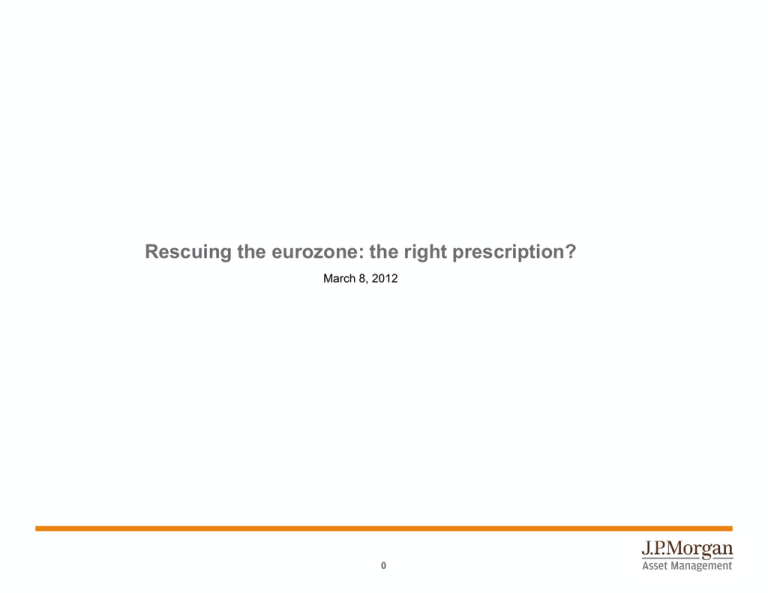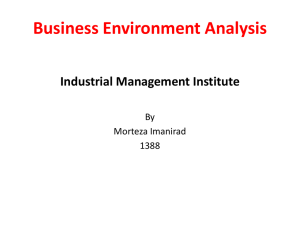
Rescuing the eurozone: the right prescription?
March 8, 2012
0
Rescuing the eurozone: the right prescription?
We view as a banking sector and government debt crisis what is really a balance of payments crisis
The tools being used to address the crisis are therefore badly-suited for the purpose
Only political will, not underlying economics, has so far stood between eurozone survival and collapse but…
…the ECB LTRO and official sector bailouts at best by time, at worst exacerbate the problems
Only restoring competitiveness in the periphery, not the ‘will of policymakers’ alone can make for lasting crisis
solution
Source: J.P. Morgan.
1
Stresses in larger peripheral bond markets and the eurozone banking
system have eased
Eurozone government debt spread
Euribor-OIS spread
Basis points over Germany
Basis points
600
150
550
125
500
Italy
Spain
450
100
400
350
75
300
250
50
200
150
25
100
50
0
0
09
10
11
09
12
10
11
Source: Bloomberg, J.P. Morgan. Data as of March 2012.
Source: Bloomberg, J.P. Morgan. Data as of March 2012.
2
12
The balance of payments: how it adds up
Balance of Payments
=
Capital Account
Current Account
(net exports, transfer payments, net factor
income)
(Foreign direct investment, portfolio investment,
cross-border lending)
+
Source: J.P. Morgan.
3
Iceland’s economy recovering from near-collapse
Iceland unemployment rate
Iceland 10-year government bond
Iceland real GDP growth
Share of labor force
Yield
Year-on-year rate
11%
10%
2009
Today
12%
2009
Today
10.6%
9.5%
4%
10%
9%
5.1%
2009
Today
2%
8%
7.2%
7%
6%
8%
0%
6.5%
6%
6%
-2%
5%
4%
-4%
4%
3%
2%
-6%
2%
-8%
1%
0%
-8.3%
0%
-10%
Source: Bloomberg, Statistics Iceland, J.P. Morgan. Data as of 2012.
4
Peripheral eurozone economy continues to collapse
SIPI* unemployment rate
SIPI* 10-year government bond
SIPI* real GDP growth
Share of labor force
Yield
Year-on-year rate
18%
2009
Today
2009
Today
2%
2009
16%
14%
10%
14.8%
8.0%
8%
1%
Today
12.9%
0%
12%
-0.2%
6%
-1%
10%
4.3%
8%
-2%
4%
6%
-3%
4%
-3.1%
2%
-4%
2%
0%
0%
-5%
Source: Bloomberg, J.P. Morgan. Data as of 2012. SIPI is Spain, Italy, Ireland, Portugal.
5
Past balance of payments crises have only been solved with major
currency devaluations
Currency devaluations in past BoP crises
Peak-to-trough
400%
360%
350%
300%
281%
250%
200%
150%
124%
115%
100%
59%
50%
27%
8%
Source: Bloomberg, J.P. Morgan.
6
Argentina
Russia
Korea
Mexico
Sweden
Canada
Eurozone
0%
The eurozone’s design flaws
Main Criteria for an ‘Optimal Currency Area’:
Free movement of goods, capital and labor (YES/NO)
Flexible wages and prices (NO)
Cross-border fiscal transfer mechanism (NO)
Source: J.P. Morgan. Based on Mundell, R. A. (1961). "A Theory of Optimum Currency Areas".
7
European support measures taken so far have failed to address the
underlying problems
Eurozone periphery* spread to German 10-year government bond yield*
Basis points
LTRO 2
1300
1200
Second set of bank
stress test results
released
Periphery
1100
€159 billion EFSF and
private sector support
package announced
1000
900
EFSF and ECB bond
purchase program
announced
800
700
600
Greece receives €110
billion loan
First set of bank
stress test results
released
€85 billion support
package for Ireland
announced
LTRO 1
500
ECB extends bond
purchases to Italy and
Spain
400
€78 billion support
package for Portugal
announced
300
200
100
Pledge of “determined and
coordinated action”
ECB extends liquidity
provision
0
Jan-10
Apr-10
Jul-10
Oct-10
Jan-11
Apr-11
Jul-11
Oct-11
Jan-12
Source: Bloomberg, J.P. Morgan. Data as of March 2012. *Equal-weighted average of Portugal, Ireland, Greece, Spain, Italy.
8
Apr-12
Eurozone lending growth still positive, but deteriorating
Eurozone lending growth
Year-on-year
20%
M2 money supply
Private sector
Household sector
Corporate sector
15%
10%
5%
0%
-5%
03
04
05
06
07
08
Source: European Central Bank, J.P. Morgan. Data as of November 2011.
9
09
10
11
12
Main elements of February’s Greek bailout package
€130 billion of official sector support over next three years
An extra €325m of spending cuts to close past budget gaps
53.5% haircut for private sector creditors with 90% participation
Interest rate cut on existing bailout loans
Public debt/GDP ratio target of 120.5% by 2020.
Source: J.P. Morgan.
10
Have we got the maxim gun?
Source: J.P. Morgan.
11
J.P. Morgan Asset Management
This document is intended solely to report on various investment views held by J.P. Morgan Asset Management. Opinions, estimates, forecasts, and statements of financial market trends that are based on current market conditions
constitute our judgment and are subject to change without notice. We believe the information provided here is reliable but should not be assumed to be accurate or complete. The views and strategies described may not be suitable
for all investors. References to specific securities, asset classes and financial markets are for illustrative purposes only and are not intended to be, and should not be interpreted as, recommendations. Indices do not include fees or
operating expenses and are not available for actual investment. The information contained herein employs proprietary projections of expected returns as well as estimates of their future volatility. The relative relationships and
forecasts contained herein are based upon proprietary research and are developed through analysis of historical data and capital markets theory. These estimates have certain inherent limitations, and unlike an actual performance
record, they do not reflect actual trading, liquidity constraints, fees or other costs. References to future net returns are not promises or even estimates of actual returns a client portfolio may achieve. The forecasts contained herein
are for illustrative purposes only and are not to be relied upon as advice or interpreted as a recommendation.
The value of investments and the income from them may fluctuate and your investment is not guaranteed. Past performance is no guarantee of future results. Please note current performance may be higher or lower than the
performance data shown. Please note that investments in foreign markets are subject to special currency, political, and economic risks. Exchange rates may cause the value of underlying overseas investments to go down or up.
Investments in emerging markets may be more volatile than other markets and the risk to your capital is therefore greater. Also, the economic and political situations may be more volatile than in established economies and these
may adversely influence the value of investments made.
All case studies are shown for illustrative purposes only and should not be relied upon as advice or interpreted as a recommendation. They are based on current market conditions that constitute our judgment and are subject to
change. Results shown are not meant to be representative of actual investment results. Past performance is not necessarily indicative of the likely future performance of an investment.
Any securities mentioned throughout the presentation are shown for illustrative purposes only and should not be interpreted as recommendations to buy or sell. A full list of firm recommendations for the past year is available upon
request.
J.P. Morgan Asset Management is the marketing name for the asset management business of JPMorgan Chase & Co. Those businesses include, but are not limited to, J.P. Morgan Investment Management Inc., Security Capital
Research & Management Incorporated and J.P. Morgan Alternative Asset Management, Inc.
Copyright © 2011 JPMorgan Chase & Co. All rights reserved.
12












